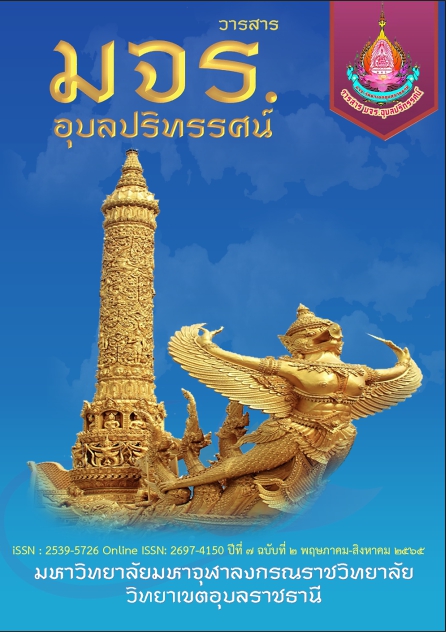A PROGRAM OF PATICCASAMUPADA AND ENNEAGRAM MODEL OF CONTEMPORARY PSYCHOLOGY FOR CREATING HAPPINESS WITH MINDFULNESS FOR WORKING WOMEN IN THAI SOCIETY
Main Article Content
Abstract
This objective of Research to 1) analyze characteristics in contemporary psychology of conscious happiness among working women in Thai society, 2) to synthesize a Dependent Origination program and a stimulated model of contemporary psychology of Enneagram contributing to happiness among working women in Thai society and 3) to present an Dependent Origination program and a stimulated model of contemporary psychology of Enneagram, contributing to happiness among working women in Thai society through qualitative approach; the Experiment Quasi by in-depth interviews with 15 experts, develop data synthesis program using six’ C techniques in experimental terms. Sampling sizes include 40 working women, 20 are placed in an experimental group and another 20 in a controlled group, Dependent Origination and a stimulated model of contemporary psychology of Enneagram contributing to happiness among working women in Thai society. Data collection tools include questionnaires in terms of such as Dependent Origination, developed characteristics, and mindful happiness with confidence value at 0.941 analyzed by statistical descriptive comparison using a Paired t-test statistics methodology and compared among groups by using Independent t-test. Findings indicate: 1) Working women are aware of sensations, do not feel suffer, greed nor and achieve nirvana. Understand the root of greed which is stemmed from lust, hatred and anger; they also understand a mechanism to protect themselves. And seem to find happiness easily and are not bothered by sufferings, feel more happiness, less sufferings and found secular happiness from religious wisdom. 2) Characteristics Dependent Origination program by using Enneagram as a tool in identifying 9 personalities while adopting principles of Dependent Origination as a tool to handle sufferings. 3) The controlled group after the experiment, they have most opinions, during, after and monitoring phase also do not indicate difference. Whereas, the monitoring phase between the experiment and controlled group indicate significant statistical differences at 0.01.
Article Details
References
กรมสุขภาพจิต กระทรวงสาธารณสุข. (2561, 28 กันยายน). กรุงเทพธุรกิจ. หน้า 8.
กรมสุขภาพจิต กระทรวงสาธารณสุข. (2562, 12 กรกฎาคม). โพสต์ทูเดย์. หน้า 12.
พระพรหมคุณาภรณ์ (ป. อ. ปยุตโต). (2553). พจนานุกรมพุทธศาสตร์ ฉบับประมวลศัพท์.
กรุงเทพฯ: ธนธัช.
พระธรรมปิฎก (ป. อ. ปยุตโต). (2541). พุทธธรรม ฉบับขยายความ. กรุงเทพฯ: มหาจุฬาลง
กรณราชวิทยาลัย.
พุทธทาส อินฺทปฺญโญ. (2557). ปฏิจจสมุปบาทจากพระโอษฐ์. กรุงเทพฯ: ธรรมสภา
พระครูภาวนาสังวรกิจ. (2562). การพัฒนาสุขภาวะองค์รวมสำหรับผู้สูงวัยตามแนวพุทธ
จิตวิทยา. บัณฑิตวิทยาลัย: มหาวิทยาลัยมหาจุฬาลงกรณราชวิทยาลัย.
พระสาทิพย์ อนาลโย. (2562). การวิเคราะห์ความสัมพันธ์ระหว่างปฏิจจสมุปบาทกับการ
บรรลุธรรม. วารสาร มจร พุทธปัญญาปริทรรศน์. 4 (2), 225.
สนิท สัตโยภาส. (2561). การใช้ทฤษฎีศาสตร์แห่งนพลักษณ์ศึกษาเหตุปัจจัยที่ส่งผลให้บุคคล
มีลักษณะนิสัยต่างกัน: กรณีศึกษานักศึกษาระดับปริญญาตรี มหาวิทยาลัยราชภัฏ
เชียงใหม่. วารสารบัณฑิตวิจัย. 9 (2), 118.
สุภัค วงศ์ดี. (2559). การพัฒนาแบบสัมภาษณ์เบื้องต้น เพื่อประเมินศักยภาพความเป็นผู้นำ
โดยใช้แนวคิดนพลักษณ์. บัณฑิตวิทยาลัย: มหาวิทยาลัยธรรมศาสตร์.

